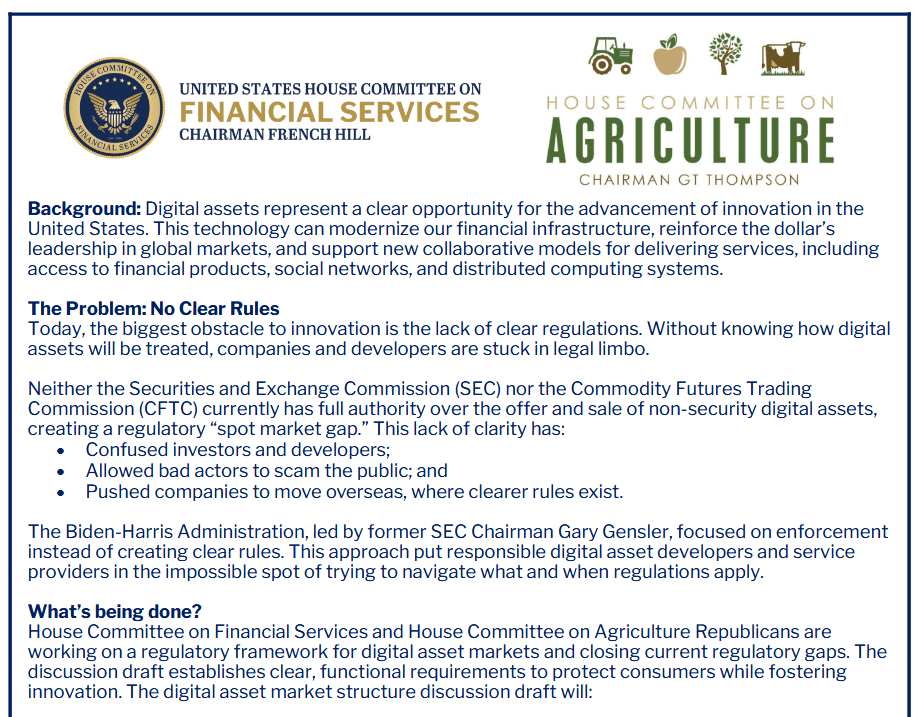-
The US crypto Bill establishes clear SEC and CFTC roles—defining which digital assets are securities versus commodities—to eliminate regulatory ambiguity.
-
By exempting DeFi protocols from broker-dealer registration, the bill balances innovation with oversight, enabling decentralized platforms to thrive.
-
African regulators and market participants can use the US legislative framework as a blueprint to craft their own comprehensive digital asset regulations.
The US crypto bill has finally emerged as a draft set to change how the US handles digital assets with its new pro-crypto trend.
Officially known as the Digital AssetMarket Structure Discussion Draft, this new bill aims to cement the guidelines governing crypto developers and market participants.
As of 5th May, the long-standing ambiguities surrounding crypto regulations will cease, but what does this mean for the African ecosystem?
This article dives into the bill’s features, exploring the roles of each entity, like the CFTC crypto oversight and SEC, how the new crypto bill affects decentralized exchanges globally and the ripple effect within Africa.
Understanding the 2025 US Crypto Bill and Its Implications for the Digital Asset Market
What is the US Crypto Bill?
On 5th May 2025, the US House of Representatives released the “Digital Asset Market Structure Discussion Draft,” aka the US Crypto Bill. This new legislation provides a comprehensive regulatory framework governing the evergrowing crypto market within the US.
The bill is a follow-up to the previous Financial Innovation and Technology for the 21st Century Act(F1T21), reflecting significant changes catering to Trump’s new pro-crypto agenda.
One of the core functions of the US Crypto Bill is to provide clear guidelines for how digital assets should be handled under US law.
CHECK OUT: Kenya Crypto Laws: Hyperfocused Pathway Through Regulatory Overwhelm
The bill specifically mandates that digital assets will fall under the jurisdiction of the Securities and Exchange Commission (SEC) and the Commodity Futures Trading Commission (CFTC).
The new SEC CFTC crypto rules aim to clarify crypto regulations for developers and market players.
Decentralized Crypto Regulations: Defining “Maturity” in Blockchain Systems
The bill has several key elements that provide insight into how Trump’s administration will handle digital assets:
- Disclosure of Token Holdings:Crypto project members owning more than 1% of the total token supply must disclose their holdings. This is to prevent market manipulation from whale traders, giving smaller players a fair go at the market
- SEC CFTC Crypto Rules:The CFTC crypto oversight focuses more on having authority over the buying and selling virtual commodities. In comparison, the SEC will oversee tokens underneath its “debated” securities class. Joint rulemaking techniques are mandated for asset delisting, ensuring both companies collaborate. This clean delineation eliminates the present-day regulatory ambiguity ensuing. Firms and small buyers know the regulations they play through.
- Decentralized Crypto Regulations:According to the new draft, DeFIi protocols enable users to engage in self-directed financial transactions and are exempted from registering as digital commodity brokers or dealers. This fosters innovation in the decentralized space while ensuring centralized platforms adhere to strict regulatory standards.
- Digital Commodities as Investment Assets:The bill categorizes digital commodities as “investment contract assets,” distinguishing them from stocks and other traditional financial assets. This streamlines with the new SEC CFTC crypto rules encompassing different types of crypto assets.
- Impact on Stablecoins and Exchanges:A crucial element of the decentralized crypto regulation is its approach to digital commodities and stablecoin. Crypto firms must now raise funds under SEC oversight while adhering to clear processes for registering their digital commodities with the CFTC. This provides a clear path for market participants within the bounds of the law.
Implications for Decentralized Exchanges and Global Markets
The US crypto bill represents a dynamic shift for the big-time and novice players within the space.
For instance, it provides crypto regulatory clarity for developers via understanding which tokens are classified as securities, digital commodities, or even DeFi protocols. This gives them legal insight into what to expect before launching their products.
In addition, a key benefit of the bill is the ease with which developers can raise funds more easily with the backing of the SEC and CFTC.
For large players seeking to understand how the new crypto bill affects decentralized exchanges, the answer might lie with the CFTC. Under the bill, the regulatory body ensures that the digital market operates transparently and fairly.
This is a major factor given the wake of scandals involving exchanges; I think we are all still fresh from the CBEX exchange fiasco.

One-pager of the digital asset market structure discussion draft submitted by House Republicans on May 5. [Photo: US House Agriculture Committee]
This is probably due to the numerous scandals, hacks and borderline deception we’ve each faced with centralized platforms.
The US crypto bill’s distinction is a blueprint for our regulatory systems.
Recently, Nigeria and Kenya released bills focusing on strict guidelines concerning their VASPs.
This was a significant milestone but left out many key players in legal ambiguity. Entities like decentralized platforms are still misusing ALL of Africa’s crypto bills.
A Catalyst for Global Regulatory Evolution
The US Crypto Bill represents a structured attempt to bring order and clarity to the dynamic world of digital assets. It seeks to cater for different players and foster innovation. Its unique approach can be a blueprint for Africa’s legal journey.
The defining SEC CFTC crypto rules, the clear outline of decentralized platforms, and the note-worthy balance between small and large players within the space are revolutionary.
Developers, investors, and market participants must stay informed about this bill’s ongoing developments to understand how it will impact their operations and ensure compliance with the emerging regulatory framework.
The US Crypto Bill could pave the way for a more stable, transparent, and inclusive crypto market, but its full impact will depend on its practicability within the coming years.

